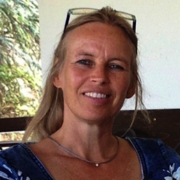- Level Foundation
- المدة 17 ساعات hours
- الطبع بواسطة Johns Hopkins University
-
Offered by

عن
This course, Public Health in Humanitarian Crises 1, introduces discussions about the public health approach to problems experienced by people affected by disasters, both natural and related to conflict. The course discusses the many changes which occur in people’s lives when they are uprooted by a disaster, ranging from changes in disease patterns, access to health care, livelihoods, shelter, sanitary conditions, nutritional status, etceteras. We will explore what humanitarian interventions could look like if we want to mitigate the effects of disasters. The course content is a mix of theoretical knowledge and many practical examples from recent disasters. We think this course is unique because it contains so many practical ‘real-life’ examples and is taught by instructors and guest lecturers who together have over 200 years of experience in this field. The course consists of 10 modules totaling approximately 9-10 hours of delivered content with an additional 2-3 hours of self-work (quizzes and writing and evaluating a short peer-review assignment) as well as lively discussions forums. The course has been designed in a way that each module builds on the lessons of previous modules. However, you may do the modules in any order and some can be done separately. You do not have to pay for this course if you choose to enroll without a certificate. Sometimes referred to as auditing, enrolling without a certificate means that you will have access to all of the videos, quizzes, assignments, and discussions. The only difference is that you will not receive a certificate upon completion. Click the Enroll Without a Certificate link to sign up and begin the course. Even if you enroll in a session that has yet to begin, you may access most of the course materials right away by clicking the Preview Course Materials link. However, you will have to wait for the session to begin before posting your comments on the discussion forum or accessing the final peer-reviewed assessment. Visit the Learner Help Center for details about session schedules. If you want to learn more, there is a second course which follows this one entitled, Public Health in Humanitarian Crises 2. We welcome you to take this. The course has a similar set-up and discusses additional topics, such as infectious disease outbreaks, disease epidemiology, maternal and newborn health, mental health, humanitarian project design, humanitarian principles, and many other topics.الوحدات
Welcome
1
Videos
- Introduction to Public Health in Humanitarian Crisis
2
Readings
- Course Schedule Flexibility
- Foundations of Global Health Specialization
Humanitarian Disasters and Public Health
5
Videos
- Introduction to Humanitarian Disasters and Public Health
- Introduction
- Disaster Trends
- Introduction to the Role of Public Health in Humanitarian Emergencies
- The Role of Public Health in Humanitarian Emergencies
2
Readings
- Meet Gilbert
- Meet Paul
Quiz
1
Assignment
- Humanitarian Disasters and Public Health
Humanitarian Actors and Coordination
6
Videos
- Introduction to Humanitarian Actors and Coordination
- Humanitarian Actors and Coordination
- Introduction to Humanitarian Coordination
- Humanitarian Coordination
- Humanitarian Coordination Models
- A Practical Example of Humanitarian Coordination
1
Readings
- Meet Mija
Module 2 Discussion
1
Discussions
- Humanitarian Crises in the News
Quiz
1
Assignment
- Humanitarian Actors and Coordination
Water and Sanitation
5
Videos
- Introduction to Water and Sanitation
- Water and Sanitation
- Sanitation Options
- Water Supply Options
- The Priorities
1
Readings
- Meet Les
Quiz
1
Assignment
- Module 3: Water and Sanitation
Livelihoods and Food Security in Humanitarian Crises
4
Videos
- Introduction to Livelihoods and Food Security
- Livelihoods and Food Security in Humanitarian Crises
- Food Security
- Livelihoods Support Programming
Module 4 Discussion
1
Discussions
- Your Reaction
Quiz
1
Assignment
- Module 4: Livelihoods and Food Security in Humanitarian Crises
Nutrition in Humanitarian Crises
5
Videos
- Introduction to Nutrition in Humanitarian Crises
- Nutrition in Humanitarian Crises
- A Case Study in Malnutrition
- Types of Malnutrition
- Treatment and Prevention of Acute Malnutrition
Module 5 Discussion
1
Discussions
- Acute Malnutrition
Quiz
1
Assignment
- Module 5: Nutrition in Humanitarian Crises
Management of Diseases in Humanitarian Crises
4
Videos
- Introduction to Management of Diseases in Humanitarian Crises
- Management of Diseases in Humanitarian Crises
- Managing an Outbreak of a Communicable Disease
- Non-Communicable Disease In Disasters
Quiz
1
Assignment
- Management of Diseases in Humanitarian Crises
Health Care in Humanitarian Emergencies
5
Videos
- Introduction Health Care in Humanitarian Emergencies
- Health Care in Humanitarian Emergencies
- Parts of a Health Service
- Introduction to Types of Health Services
- Types of Health Services
Quiz
1
Assignment
- Health Care in Humanitarian Emergencies
Shelter in a Humanitarian Setting
3
Videos
- Introduction to Shelter in a Humanitarian Setting
- Shelter in a Humanitarian Setting
- Shelter Solutions
1
Readings
- Meet Martin
Module 8 Discussion
1
Discussions
- Finding Shelter
Quiz
1
Assignment
- Module 8: Shelter in a Humanitarian Setting
Protection of Displaced Populations: Human Rights & Humanitarian Law
7
Videos
- Introduction to Protection of Displaced Populations
- Protection of Displaced Populations: Human Rights and Humanitarian Law
- The Displaced Populations
- International Law
- International Humanitarian Law (IHL)
- Refugee Law and Refugee Protection
- Solutions for Refugee Situations
1
Readings
- Meet Jana
Module 9 Discussion
1
Discussions
- Refugees and Internally Displaced Persons
Quiz
1
Assignment
- Protection of Displaced Populations: Human Rights & Humanitarian Law
Emerging Risks, Challenges, and Opportunities for Future Humanitarian Emergencies
6
Videos
- Introduction to Emerging Risks, Challenges, and Opportunities for Future Humanitarian Emergencies
- Changing Risk Patterns for Humanitarian Emergencies
- Introduction to Challenges and Opportunities for Future Humanitarian Emergencies
- Challenges and Opportunities for Future Humanitarian Emergencies
- Future Opportunities
- Conclusion
Quiz
1
Assignment
- Module 10: Emerging Risks and Opportunities for Future Humanitarian Emergencies
Peer Assessment
1
Peer Review
- Current Crises Around the World
Auto Summary
"Public Health in Humanitarian Crises 1" is an insightful course under the Personal Development domain, designed to educate learners about the public health challenges faced by populations affected by natural disasters and conflicts. Led by Coursera, this course delves into the life changes individuals experience during crises—such as shifts in disease patterns, healthcare access, livelihoods, shelter, sanitation, and nutrition—while exploring effective humanitarian interventions to mitigate these impacts. Learners will benefit from a mix of theoretical knowledge and practical examples drawn from recent disasters, taught by highly experienced instructors and guest lecturers with over 200 years of combined expertise. The course spans 10 modules, providing around 9-10 hours of instructional content, complemented by 2-3 hours of self-directed activities, including quizzes, assignments, and peer reviews. Interactive discussion forums also enhance the learning experience. Participants can enroll for free without a certificate, gaining access to all course materials, quizzes, assignments, and discussions. Alternatively, they can opt for a paid subscription to receive a certificate upon course completion. This foundational-level course is ideal for anyone interested in humanitarian work, disaster response, public health, or personal development. For those seeking further knowledge, a follow-up course, "Public Health in Humanitarian Crises 2," is available, covering advanced topics such as infectious disease outbreaks, epidemiology, maternal and newborn health, mental health, and humanitarian project design. Join now to develop a robust understanding of public health in humanitarian contexts and learn how to make a positive impact in disaster-affected communities.

Gilbert Burnham, MD

Mija Ververs


